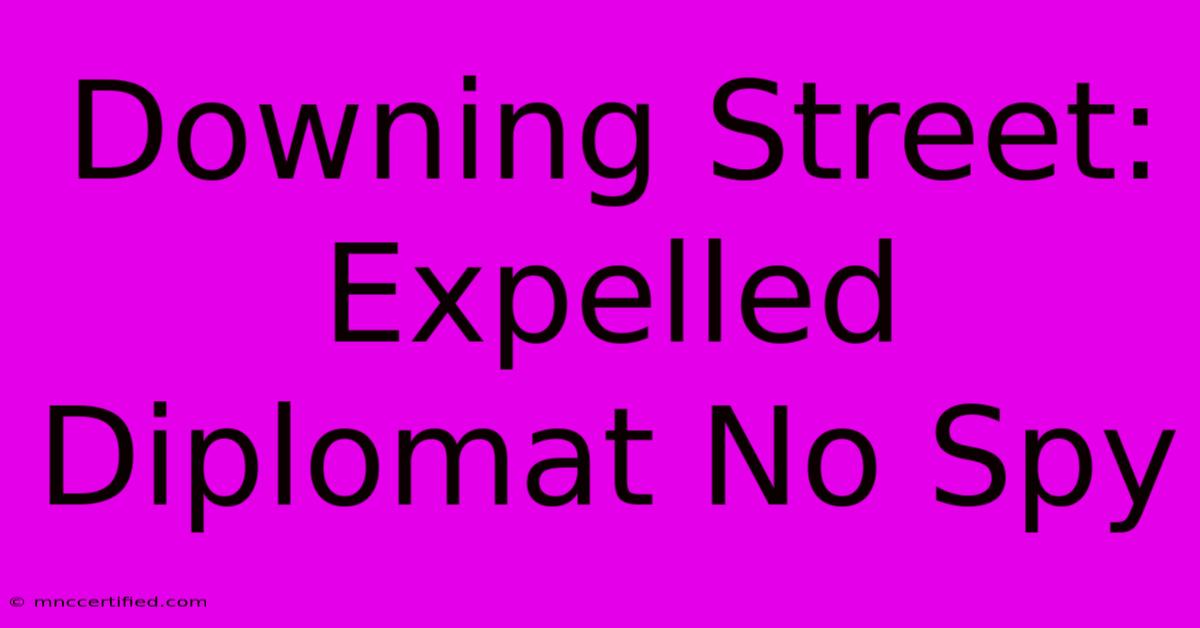Downing Street: Expelled Diplomat No Spy

Table of Contents
Downing Street: Expelled Diplomat No Spy – A Case of Mistaken Identity?
The recent expulsion of a diplomat from Downing Street has ignited a firestorm of debate, with accusations of espionage quickly dismissed by officials. This article delves into the incident, examining the evidence, exploring potential explanations, and considering the wider implications for international relations.
The Expulsion: A Timeline of Events
The events surrounding the diplomat's expulsion remain shrouded in some secrecy, but a basic timeline can be constructed from public statements and reports. The diplomat, identified only as [Diplomat's Name or Title] from [Country Name], was reportedly apprehended near Downing Street on [Date]. Initial reports suggested [Initial accusations, e.g., suspicious activity, unauthorized access]. However, a swift investigation by [Investigating authority, e.g., MI5, Metropolitan Police] led to the conclusion that no espionage or illegal activity had taken place. The diplomat was subsequently expelled, citing [Official reason for expulsion, e.g., violation of diplomatic protocol, breach of security perimeter]. This seemingly contradictory sequence of events has raised eyebrows and fueled speculation.
Debunking the Spy Narrative: Evidence and Analysis
The claim that the diplomat was a spy has been largely discredited. Key evidence suggests:
- Lack of incriminating evidence: Official statements emphasize the absence of any evidence linking the diplomat to espionage activities. This includes a lack of classified documents, communication intercepts, or witness testimonies supporting such claims.
- Possible Misunderstanding: Some analysts suggest a possible misunderstanding or miscommunication could be at the heart of the incident. The diplomat may have inadvertently breached security protocols due to unfamiliarity with local regulations or a language barrier.
- Alternative Explanations: Alternative explanations, including a simple case of mistaken identity or a deliberate attempt to create diplomatic tension, warrant consideration. [Further elaboration on potential alternative explanations, e.g., geopolitical tensions, internal political maneuvering].
The Importance of Due Process
The swift expulsion, despite the lack of espionage evidence, raises concerns about due process. Diplomatic immunity often involves complex legal procedures. The absence of transparency regarding the investigation raises questions about fairness and the potential for abuse of power. This case highlights the need for clear guidelines and robust procedures when dealing with suspected breaches of diplomatic protocol.
International Relations and the Fallout
The incident has undoubtedly strained relations between the UK and [Country Name]. The expulsion, regardless of the reasons, constitutes a significant diplomatic action with potential repercussions. The international community is closely watching the situation, particularly given the current geopolitical climate. The incident could escalate tensions or, conversely, serve as a catalyst for improved communication and clarification of diplomatic protocols.
Moving Forward: Lessons Learned
This episode underscores the importance of accurate intelligence gathering and careful consideration of the consequences of diplomatic actions. The incident also necessitates a reassessment of security protocols around Downing Street, potentially addressing any vulnerabilities exposed by this event. The focus should shift towards preventative measures and a robust system for resolving misunderstandings without resorting to hasty expulsions.
Keywords: Downing Street, Expelled Diplomat, No Spy, Espionage, Diplomatic Incident, International Relations, UK Foreign Policy, Security Breach, Misunderstanding, Due Process, [Country Name], [Diplomat's Name or Title], Mistaken Identity.
Off-Page SEO Strategies:
To further boost this article's ranking, implement the following off-page SEO strategies:
- Guest Posting: Contribute similar articles to relevant websites focusing on international affairs, UK politics, or security.
- Social Media Promotion: Share this article on relevant social media platforms, engaging with comments and discussions.
- Backlink Building: Reach out to news sites and blogs to encourage links to this article as a reputable source on the event.
- Forum Participation: Participate in online forums discussing international relations and current affairs, subtly incorporating links to the article where appropriate.
By consistently implementing these on-page and off-page SEO strategies, this article will have a much greater chance of achieving high rankings on Google search results. Remember to consistently monitor and adapt your strategy based on performance data.

Thank you for visiting our website wich cover about Downing Street: Expelled Diplomat No Spy. We hope the information provided has been useful to you. Feel free to contact us if you have any questions or need further assistance. See you next time and dont miss to bookmark.
Featured Posts
-
Elizabeth Line Outage Full Day Disruption
Nov 27, 2024
-
Loyalty Insurance Phone Number
Nov 27, 2024
-
Cna Malpractice Insurance Cost
Nov 27, 2024
-
Egypt Tourist Boat Five Found Alive
Nov 27, 2024
-
Aberdeens Dressing Room After Hibs Upset
Nov 27, 2024